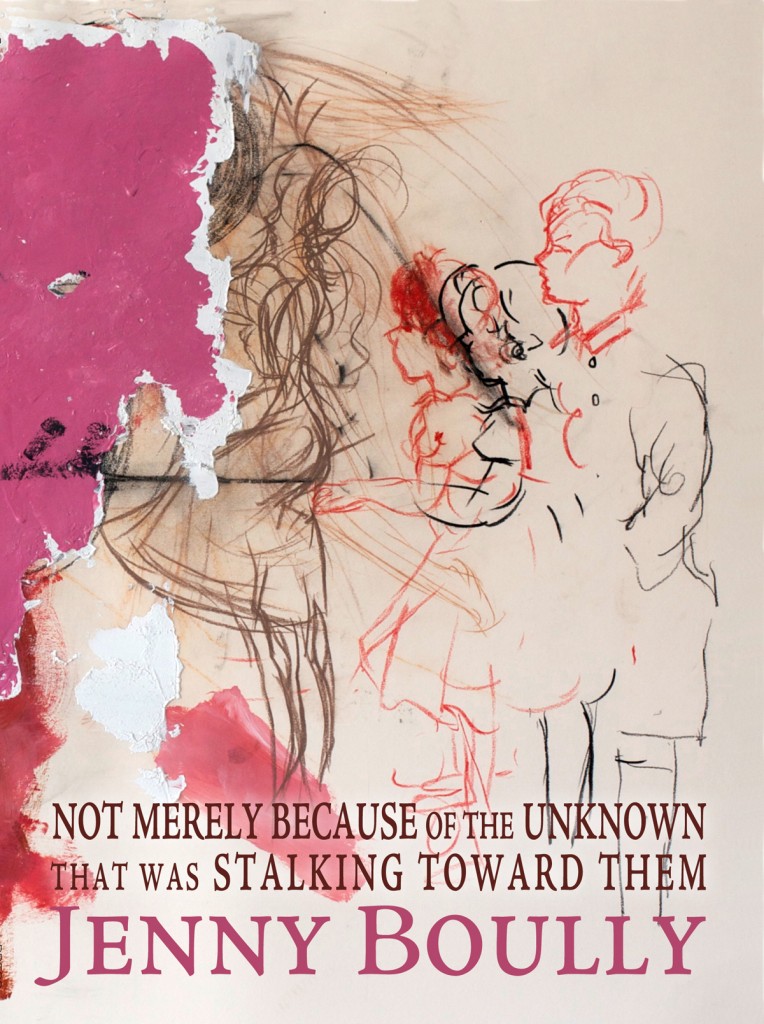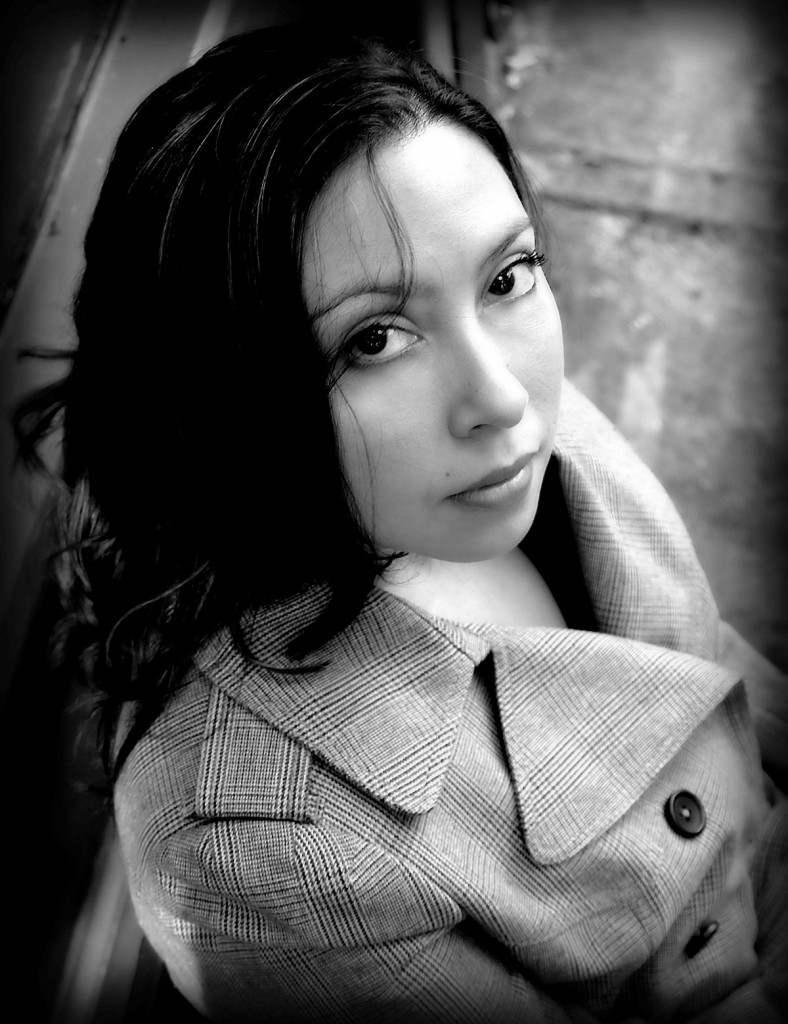 not merely because of the unknown that was stalking toward them
not merely because of the unknown that was stalking toward them
Jenny Boully
ISBN 9780982541678 | Fiction/Poetry/Lyric Essay | 6″x8″, 80pp., pbk. | June 2011
Cover art by Noah Saterstrom
$14 includes shipping in the US
(vs. $16 + $3.99 shipping elsewhere)
Order by check
[wp_cart_button name=”Boully, not merely” price=”14″]
In not merely because of the unknown that was stalking toward them, Jenny Boully presents us with a “deliciously creepy” swan song from Wendy Darling to Peter Pan. As in her previous book [one love affair]*, Boully reads between the lines of a text—in this case J. M. Barrie’s Peter and Wendy—and emerges with the darker underside, with those sinister or subversive places merely echoed or hinted at. Funny, sinister, and heartbreaking by turns, not merely because of the unknown that was stalking toward them explores, in dreamy and dark prose, how we love, how we pine away, and how we never stop loving and pining away. Her Neverland is bawdy, bursting, and beautiful.
A Small Press Distribution Fiction Bestseller!
Peter Pan was a postmodern tour de force written at the height of Modernism — and if the very best collections of literary art at least gesture toward their immediate influences, this is undoubtedly the contemporary re-treatment that Peter Pan deserves. Boully has captured the darkness of Barrie’s text, and in elevating its inter- and sub-textualities to the level of discourse she illuminates and reinvigorates her source material without sacrificing any of its creepiness, wonder, or violence. Simultaneously metaphysical and visceral, these addresses from Wendy to Peter in lyric prose are scary, sexual, and intellectually disarming.
—Seth Abramson, Huffington Post
Boully, both a poet and an essayist by experience, knows perfectly well how to weave together the intricacies of chosen words and images with an arc essential to an impacting story, and the key to her prose here lies not in its darkness or its grownup-ness, but rather its careful tiptoeing between the minds and hearts of characters whose surfaces we’ve known for decades…. [T]o delve into Boully’s work is to dive with faith from the plank — to jump, with hope and belief and a wish to see what the author has given us: a fresh, imaginative look at a tale as ageless as Peter himself. One must, when reading the work, “dispel every other thought,” as Calvino would say. They must find themselves in a locked room, perhaps on a couch, perhaps in the bath (to dream of mer-creatures), or perhaps almost prostrate in bed with wide and absorbing eyes. They must be willing to fly themselves….
—Micah McCrary, Bookslut
[P]erhaps most prominent are questions related to traditional gender roles and the budding sexuality of the story’s youth, which every other adaption appears to have dulled down. . . . [But not merely] offers more questions than answers. Who are the Lost Boys, really, and why are they clothed in bearsuits? What’s the history between Peter and Mrs. Darling? How many other little girls did Peter whisk off to Neverland? How does one properly dispose of Never poo? About Tinkerbell, Boully wonders: “where ever will we get such small medical supplies for you? The Tinker dental dam; the Tinker tampon.” . . .
—Kristin Sanders, HTML Giant
Jenny Boully is a deeply weird writer—in the best way. It’s not just her subject here, the Peter Pan story, but the way she reconfigures it—rips all the stuffing out of it, pops off its heads and parts, then shuffles, sexes, and reanimates it. You might expect her primary mode to be narrative, and it is, but this book’s weird sweet homunculus heart is in the inquiry into and against these narratives, and the seams between real and not-real. I for one am glad that Boully sanded that safe, sane veneer right back off the story so it’s become raw, confused, glorious, new.
—Ander Monson
This isn’t just a book about pubescent sex or sticking things “in” the other. It’s a book about politics of motherhood, of aging, of growing things (babies, gourds, thimbles) inside you and expecting them not to erupt. It’s about the desire to fly (Peter-bird, Wendy-bird—are birds always young?) away from one kind of make-believe to another, which is to say it is about the form of things—the shape things take—girls, women, peters, tinkers, hooks and books—and how through their amorphous (cross-genrey) ways, they can stick more deeply.
—DIAGRAM
“Sewing,” “pockets” and “stories” being things that don’t quite exist in the Neverland, Jenny Boully’s not merely because of the unknown that was stalking toward them sews pockets in and around the mythos of J.M. Barrie’s Peter and Wendy. Cutting snippets of Barrie’s source text, including Barrie’s Peter Pan in Kensington Gardens and events in Andrew Birkin’s J.M. Barrie & the Lost Boys, Boully centralizes Wendy’s experience and sews up bits of her story, stitching the make-believe into the made-quite-real. In her pockets, open ends and open endings fit and hover…. The realness of make-believe washing, make-believe medicine, make-believe food and make-believe sex—stink, sickness, malnutrition and still-birth—peep through Boully’s stitches.
—Jai Arun Ravine, The Lantern Review
Boully’s book subtly reveals how we engage in the act of creating narrative through our reading in order to find our own place within a narrative—in order to be placed within a narrative ourselves—in the same way that we place characters via our definition of them. This makes narrative a kind of place that we look to find ourselves within or that we try to settle ourselves within. We seek it out like a home because it feels familiar or because it began from the origins of something that felt familiar. . . . Of course, if we are in search of a narrative structure that we can depend on to be there to carry us through the course of the book then Boully’s book will not let us find one. Instead, we must be satisfied to continually seek out a home in an unstable narrative or through characters that move beyond the walls of habitual name and narrative.
—Karen Hannah, Open Letters Monthly
What Boully does with J.M. Barrie’s Peter and Wendy is both astonishing and creepy. The book is genius. We follow her footnotes, which is the book’s format more or less. The result is at turns disgusting, dark, humorous and merciless to the original story’s naivety. Boully does a wonderful job of bringing Peter and Wendy home to reality, creating a unique read that, whether intentionally or not, reflects present times all too bluntly. We find ourselves in a cozy makebelieve setting, only to see it wrought with human flaws and failures. Sound familiar? For fans of collage and experimental fiction.
—Hey, Small Press!
excerpts from not merely because of the unknown that was stalking toward them
Academy of American Poets | Fourth Genre: Explorations in Nonfiction | Requited | Shampoo
 about Jenny Boully
about Jenny Boully
Jenny Boully is the author of [one love affair]* and not merely because of the unknown that was stalking toward them, from Tarpaulin Sky Press, as well as The Book of Beginnings and Endings (Sarabande, 2007) and The Body: An Essay (Essay Press, 2007 and Slope Editions, 2002), and the chapbook Moveable Types (Noemi Press, 2007). Her work has been anthologized in The Next American Essay, The Best American Poetry, Language for a New Century, and Great American Prose Poems.